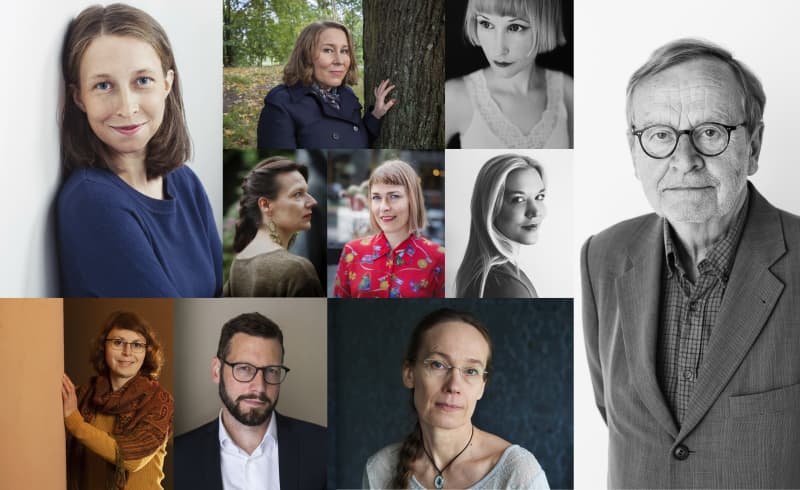
Ten works are competing for the prestigious literary prize. A large part of them challenge literary genres. Only three actual novels are included.
The pre-jury of the Runeberg Prize for fiction has once again finished its huge number of readings. The candidates were announced at Runeberg’s home in Porvoo on Thursday.
In their speech, the jury praised the level of domestic literature and highlighted the year-by-year decrease in the number of men among the candidates.
Only a third of the books read by the council were written by men, while just last year their share was three quarters. Only two works by a supposed male author ended up among the final candidates.
One of the reasons the jury thought was that not only reading but also writing has decreased, especially among men.
– Another interesting observation is that the works that challenge literary forms and structures are mostly written by women, the jury states.
Here are the 2023 Runeberg candidates:
According to Raadi, the work is a collection of observations, glimpses and moods. It does justice to the short story genre and illuminates all of humanity through its carefully selected moments. One of the big questions in the collection is whether our perception of our past corresponds to what we actually lived.
Read Yle’s book review in Swedish here.
The jury describes Haahtela’s work as a gentle and merciful description of man’s search and mysteries, not all of which need to be answered. The narrator brings the reader closer to the text. The short novel published by Otava concludes the Haahtela trilogy, but also works as an independent work.
Listen to the Creation Story *Jacob’s Stairs*:
Haahtela has also been Yle’s cultural guest.
According to the jury, *Selkounie handbook* explores the strange and ominous hidden in society and in all of us. The jury describes Holmström as a writer with an eye for both details and long time spans. The short stories take the unimaginable things of the present towards the fantasies of the future. At that point, the border between utopia and dystopia cracks.
Holmström talks about his writing in an interview with Yle Vega:
In Järventauta’s sixth collection of poems, \”the world dips and is\ says the jury. The language of the work, linguistic thinking, is peculiar and subjective, yet common and recognizable. With repeated sentences, the poet pursues an idea: how to speak of spring, how to speak of the day, without which there is nothing.
The collection published by the work was also nominated for Ylen’s Tanssiva karhu award:
In Kyllönen’s novel, the Runeberg-raad thinks there is something magical and wonderfully ordinary at the same time. The story moves forward with strong emotion and expressive sentences and brings nature close to the reader. The explanation also mentions the words \”Kaleva atmosphere\”.
Kyllönen talks about the exceptionally long creation process of his book published by Teos in the Yle podcast.
The first novel published by Like is actually called *Punelma, an essay-like novel, a feminist autopsy on the material and linguistic bonds of our society*.
Read the review on the website of Kulttuuritivitis.
Liski’s collection of short stories has been published by S
The review of the book can be found on the website of Helsingin Sanomat.
Luhtavaara’s poetry collection shows, according to the jury, how poetry can show reality in a new way: shiny black leotards, for example, turn women’s backsides into beetles. The jury’s reasoning states that the piece moves from the seashore to the mirror, wondering why it is necessary to be beautiful and at the mercy of culture.
Read the review of the poetry collection published by Teokse in the online magazine Kiiltomado.
According to the jury, Nielsen’s poetic essay approaches our conflicting relationship with the objects we surround ourselves with with warmth, humor and critical precision. He not only looks at the flood of stuff that fills drawers and imaginations, but looks at our emotional connection to matter.
Schildts
According to the Runeberg council, *Destruction: a case report*, which deals with the violence children encounter in the school world, touches on the pain points of both modern society and the individual. The novel describes a broken person’s relationship with the world that shares his history, the basics state. The text is described as physical and the narrative solutions are skillful.
The novel published by Siltala already won Finlandia, the biggest literary award in Finland. You can read Rauma’s interview at this link.
Iida Rauma visited Yle in the morning:
The winner will emerge on Runeberg day
The Runeberg Prize is open to all Finnish works of fiction. It has been shared 36 times so far. The prize amount is 20,000 euros, which is jointly paid by the newspaper Uusimaa and the city of Porvoo.
The winner will be announced on Runeberg Day, February 5, 2023.
*Who is your favorite? The discussion about the candidates is open until 23:00 on 8 December 2022.*
